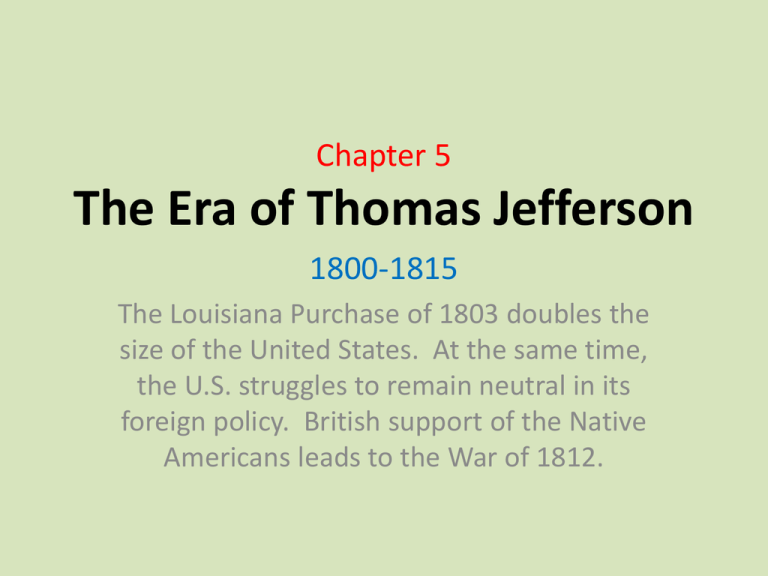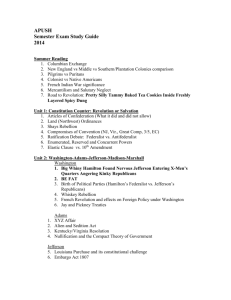Jefferson Takes Office - El Segundo Middle School
advertisement

Chapter 5 The Era of Thomas Jefferson 1800-1815 The Louisiana Purchase of 1803 doubles the size of the United States. At the same time, the U.S. struggles to remain neutral in its foreign policy. British support of the Native Americans leads to the War of 1812. Chapter 5, Section 1 Jefferson Takes Office p. 184-187 Thinking of his election as “the Revolution of 1800,” President Jefferson hopes to make far-reaching changes in government. 5.1 SECTION FOCUS QUESTION: Why is Jefferson’s victory over Adams often called the “Revolution of 1800”? Republicans Take Charge • Brutal Election of 1800: Jefferson defeats Adams • Aaron Burr ties Jefferson in the Electoral College – Burr was Jefferson’s running mate. – Who decides disputed elections? • Election goes to the House of Representatives Thomas Jefferson – After 36 votes, Alexander Hamilton gives the Federalist vote to Jefferson – “Better Jefferson and his principle, than Burr, who has none!” -A. Hamilton 1800 Alexander Hamilton Aaron Burr Jefferson Charts a New Course • New Republican Policies: • Limit the power of the Federal government. – “Strict” interpretation of the Constitution • laissez faire economics – French phrase: the government should not interfere in economy “We are all Republicans; we are all Federalists.” – Thomas Jefferson March 4, 1801 (from his 1st inauguration speech) • Kept some Federalist Policies: – Hamilton’s Finance System & the National Bank Jefferson’s “Revolution” ______ ____ _________ ____ _____ ____ p. 186 ____ The Supreme Court & Judicial Review • Chief Justice John Marshall (Federalist) & Marbury vs. Madison (1803) establishes judicial review – authority of the Supreme Court to strike down unconstitutional laws – Judiciary Act of 1789 is unconstitutional – Supreme Court gets its power from the Constitution, NOT from Congress. • Jefferson fails to curb the power of the judicial branch. John Marshall 4th chief Justice of the U.S. Supreme Court 5.1 SECTION FOCUS QUESTION: Why is Jefferson’s victory over Adams often called the “Revolution of 1800”? There was a transfer of power from the Federalists to the Republicans. Changes were made to reduce the power of the federal government while keeping much of the economic policies intact.







